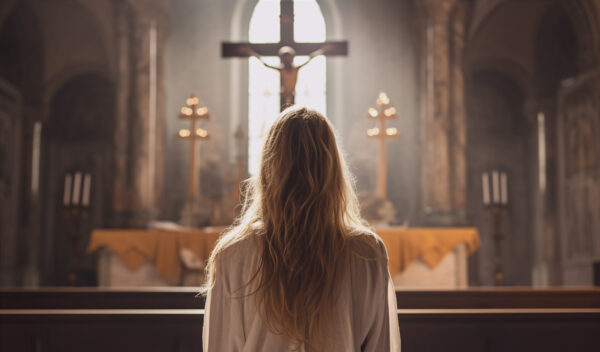In perhaps the most beautiful passage in his Confessions, St. Augustine writes, “For behold thou wert within me, and I outside … .” The great Doctor of the Church, reflecting upon his riotous youth, recognizes that he sought happiness in temporal entities, unaware that the source of all happiness abided within him. In the first days of quarantine, as silence rejoiced in admittance, his words rang with a deep, affecting relevance. Suddenly stripped of modern-day superfluity, freed from worldly distractions, we too can experience Augustine’s enlightenment.
Annually, in the season of ashes, we are reminded of the fragility of human life. This year, that reminder took on a flesh that shocked, terrified and desolated us with its ghastly tangibility. We, who have created machines that fly, stockpile wealth and erect cities of gleaming innovation, find ourselves nearly powerless in the face of a disease that has torn mercilessly through our world. We find ourselves trapped, wanting and fearful. Everything that once kept us falsely cocooned has been taken away, shattered, relegated to a past time of seeming bliss. From whence will our succor now come? In silence, we hear the answer whispered — that it will come from within, from that abundant source of love and mercy and paternal compassion that exists within our very souls. And we will stumble upon it in these days of simplicity, solitude and silence.
For so long, the world rushed about to the crashing cacophony of cymbals and trumpets and beating drums that heralded progress, success, humanity endeavoring ever closer to godliness. Now, we have been forced to abandon this incessant striving and return to our homes, where simple delights once forgotten have begun to reemerge. We rejoice in a laden bag of groceries, a mid-afternoon stroll amidst nature that knows not our woes, the very feeling of air flooding our lungs. We prepare wholesome meals, write to loved ones and occupy the once-abandoned front porch swing. Life has slowed. Inaction, one of our century’s greatest fears, has seeped into our days. Though peculiar, unexpected and brought about by sorrowful circumstances, we should not repel nor disdain this slowdown. Instead, we should see this time as an invitation for true joy to enter into our lives.
As we walk in the shadow of tragedy, the Lord, the Everlasting Dawn, shines upon us. He calls us into deeper reliance upon him, promising to be our hope, our joy, our present and our future even in this time of agitation and uncertainty. While the news resounds with constant reminders of our weakness, mortality and humanity, the Lord assures us that in him is strength and everlasting life. We are powerless, but he is not. We do not need days replete with entertainment, interaction and noise, for such things keep us from true happiness, rather than supply it. As Augustine writes, “And this is happiness, to be joyful in thee and for thee and because of thee … .” Though many of the amusements of our world have been shuttered, our joy and happiness have not.
In his epic novel “Island of the World,” the great Catholic author Michael O’Brien carries us through the life of Josip Lasta, an exile from war-torn Croatia. This character experiences life in all of its wonders, joys and deepest pains. Ultimately, he finds his greatest peace while living in a “one-room apartment in a crumbling building” that he deems “splendid.” Here, the man who passed through many turbulent decades and bears a myriad of scars — seen and unseen — finds joy in his humble, seemingly unremarkable days: “Yes, he is rich — he is a man who can distill sight and insight onto bits of salvaged paper; he is a man who can enjoy taking the garbage down to the corner; he can chat with fishermen and carpenters and housewives … . Every day he can swim in the greatness of the ordinary. This is freedom, and he is very grateful for it. It is all good, just as it is.”
The aging man delights in his collection of books, cups of coffee and baskets of figs, and his knowledge of a patient, loving and merciful Father. He neither needs nor desires anything else. Like Josip, we find ourselves in days that plod by in quiet ordinariness. Can we, too, recognize the ordinary as greatness, as freedom?
Though this is, in many ways, a sorrowful time, we must still seek the light in the hand we have been dealt. By settling into this new normal, perhaps we will find that a simple life is indeed the most magnificently complex. We may see that the intoxicating distractions of the world hinder us from witnessing the true glory of humanity; that the flesh and all its glittering accoutrements are but the vastly inferior prelude to the splendor of a life lived for above. When the outside has been taken away, we must turn within. And, in doing so, our lives will become stories of souls, rather than of mere bodies.




